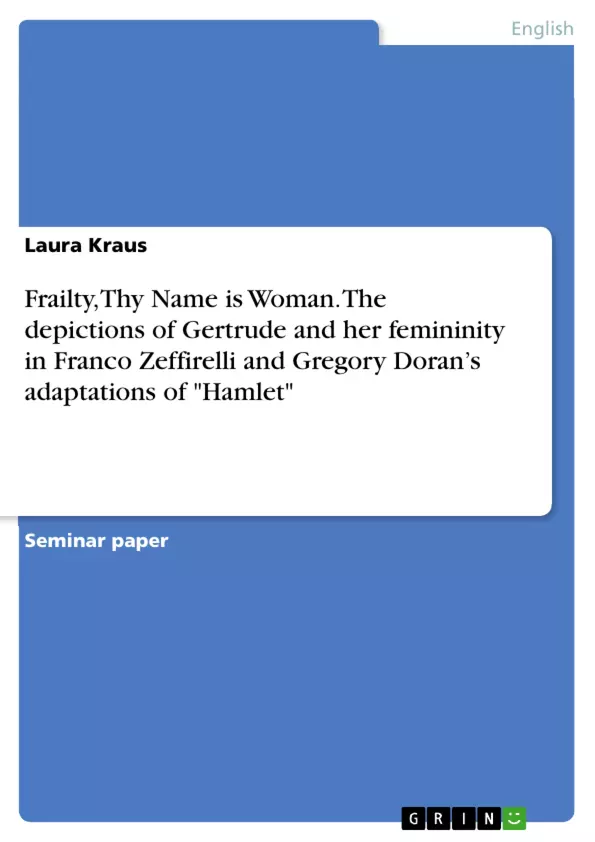The directors reinterpret the character of Gertrude to fit a more contemporary understanding of womanhood whilst considering the play’s misogyny: Zeffirelli's Gertrude represents a glorified woman, objectified by the male gaze and Doran's Gertrude an autonomous woman, who is prone to being manipulated.
Inhaltsverzeichnis (Table of Contents)
- Introduction
- Gertrude's Autonomy at Court
- Gertrude's Role as a Woman
- Gertrude's Role as a Wife and Widow
- Gertrude's Role as a Mother
- Conclusion
- Works Cited
Zielsetzung und Themenschwerpunkte (Objectives and Key Themes)
This essay explores the portrayal of Gertrude in Franco Zeffirelli's and Gregory Doran's adaptations of Hamlet, examining how the directors reinterpret her character in light of contemporary understandings of womanhood and the play's misogyny. It aims to analyze how Gertrude's autonomy is shaped by the expectations and prejudices of the play's male characters and to assess the extent to which film adaptations succeed in emancipating her from the patriarchal constraints of the original text.
- The influence of societal conventions and expectations on Gertrude's autonomy.
- The role of the male gaze in shaping the perception of Gertrude's character.
- The impact of film adaptations on the interpretation of Gertrude's character.
- The ways in which film adaptations attempt to modernize and emancipate female characters.
- The challenges of reinterpreting Gertrude's character while remaining faithful to the original text.
Zusammenfassung der Kapitel (Chapter Summaries)
- Introduction: This chapter provides an overview of the essay's focus, highlighting the prevailing negative perception of Gertrude in critical interpretations and the need for a reevaluation of her character in light of feminist scholarship and contemporary understandings of womanhood. The chapter also introduces the two film adaptations under examination – Zeffirelli's (1990) and Doran's (2009) Hamlet – and their contrasting approaches to Gertrude's character.
- Gertrude's Autonomy at Court: This chapter delves into the complexities of Gertrude's position at the court of Elsinore. It examines how her agency is limited by the expectations of the play's male characters, particularly Claudius, Hamlet, and the Ghost, who project upon her multiple roles and responsibilities. The chapter explores the tension between Gertrude's need to conform to societal expectations and her attempts to assert a degree of autonomy within a patriarchal system.
- Gertrude's Role as a Woman: This chapter analyzes how film adaptations depict womanhood in relation to female autonomy, focusing on the portrayal of Gertrude in Zeffirelli's Hamlet. It examines how the film elevates Gertrude to the center of attention, highlighting her physical appearance and youthful mannerisms. The chapter also explores the potential pitfalls of this approach, considering the argument that such glorification can also lead to objectification and degradation.
Schlüsselwörter (Keywords)
This preview examines the portrayal of Gertrude in Hamlet, focusing on themes of female autonomy, societal expectations, misogyny, film adaptation, and the interplay between medieval and contemporary understandings of womanhood. The essay delves into the complexities of Gertrude's character, considering her position within the patriarchal structures of the play and the ways in which she is shaped by the perceptions and expectations of the male characters.
Frequently Asked Questions
How is Gertrude portrayed in Zeffirelli's Hamlet?
Zeffirelli portrays Gertrude as a glorified woman, often objectified by the male gaze, focusing on her physical appearance and youthful mannerisms.
What is the difference in Gertrude's autonomy in Doran's adaptation?
Doran presents Gertrude as a more autonomous woman who, despite her independence, remains prone to manipulation within the court's power structures.
How does the "male gaze" affect the character of Gertrude?
The male gaze refers to how male characters (Claudius, Hamlet, the Ghost) project their own expectations and prejudices onto her, limiting her true agency.
Does the essay address Shakespearean misogyny?
Yes, it examines how modern directors reinterpret Gertrude to fit contemporary understandings of womanhood while grappling with the original text's misogynistic themes.
What roles does Gertrude fulfill at the court of Elsinore?
The study analyzes her complex roles as a woman, a wife/widow, and a mother, and how these roles conflict with her personal autonomy.
- Quote paper
- Laura Kraus (Author), 2021, Frailty, Thy Name is Woman. The depictions of Gertrude and her femininity in Franco Zeffirelli and Gregory Doran’s adaptations of "Hamlet", Munich, GRIN Verlag, https://www.grin.com/document/1334155



